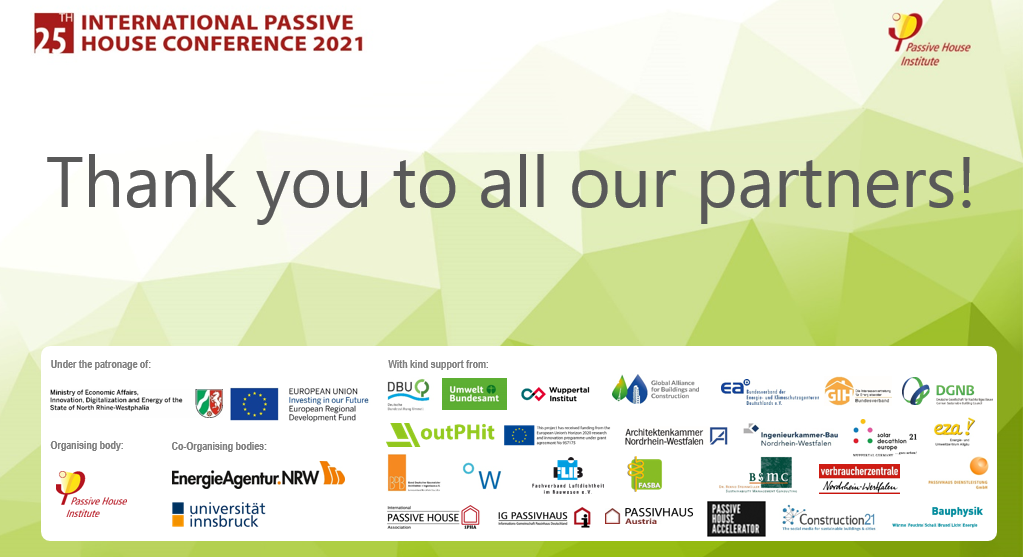30 years old ˗ more relevant than ever!
25th International Passive House Conference: energy efficiency is the key

Passive House is celebrating its 30th birthday – and is more relevant than ever before. The 25th International Passive House Conference demonstrated how important it is to implement climate protection in buildings on a large scale. The Passive House Institute moderated the anniversary conference live in the Historic Town Hall of Wuppertal, for the participants it took place online. The research institute emphasised the key role that energy efficiency plays for climate-compatible building stock. The atmosphere became celebratory during the triple jubilee and the presentation of the Passive House Award 2021 to 14 awardees in total. Towards the end, the Passive House Institute announced that the 26th International Passive House Conference would take place in Spring 2023.
Pivotal role of energy efficiency
Around 700 participants registered for the 25th International Passive House Conference, which took place mainly online due to rising COVID-19 case numbers. In a joint presentation, the Passive House Institute explained the key role that energy efficiency plays in climate protection. Through extremely energy efficient buildings, it is possible to reduce CO₂ emissions in the building sector significantly. However, so far, not enough attention has been given to energy efficiency in the construction industry, explained Professor Wolfgang Feist, founder of the Passive House Institute. A high level of energy efficiency is also required for building refurbishments which are necessary on a large scale in order to achieve a climate-neutral building stock.
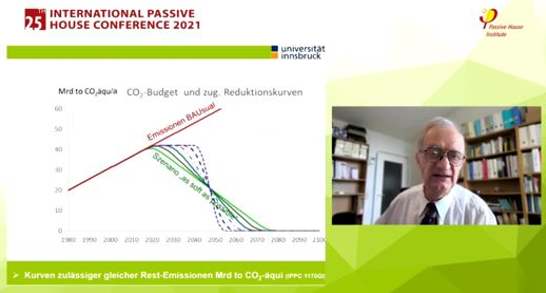
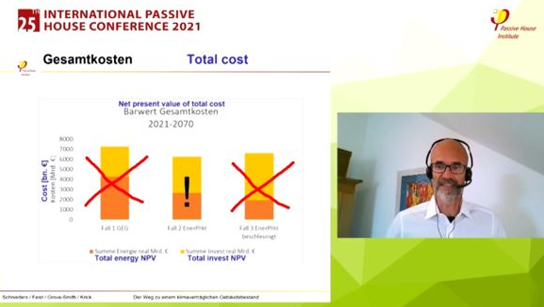
If you do it, do it properly!
However, the German Building Energy Act (GEG) stipulates an unambitious standard that does not do justice to climate protection objectives, explained Dr Jürgen Schnieders of the Passive House Institute. In the case of building renovations, in terms of total costs, it is the most economical option to implement the more ambitious EnerPHit standard which represents the Passive House standard for existing buildings. If the modernisation of building components is already pending, then these must be brought up to a sustainable standard. In contrast, an initiative for accelerated renovation which significantly exceeds the normal renewal cycles, is considerably more costly. Even more importantly, the planners and craftsmen required at short notice for this are simply not available, explained Schnieders.
Promoting high quality
Using specific examples, Professor Benjamin Krick of the Passive House Institute showed how important it is to reduce the space heating demand of a building first. "What we implement today in building construction will remain with us for the next few decades. If I have to replace the windows anyway, then I will have triple glazed windows installed. The same applies for the roof and for the wall plaster: if these building components are renewed, then I should also add thermal protection to these measures," added Jessica Grove-Smith of the Passive House Institute. As an incentive, it is essential to promote only those measures which will lead to a high level of energy efficiency. Mediocre measures, on the other hand, must not be supported any further, said Grove-Smith.
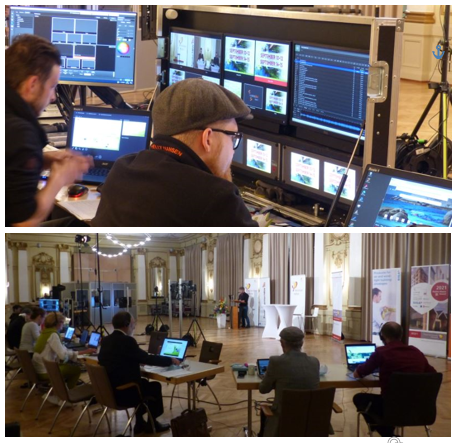
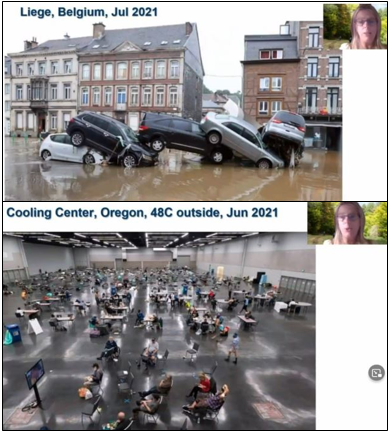
Act now!
Facts on climate change were provided by Professor Diana Ürge-Vorsatz of the UN's Intergovernmental Panel on Climate Change (IPCC). The climate scientist warned that more and more frequent extreme weather events as a result of climate change should be taken seriously and that something needs to be done about this. CO₂ emissions must be reduced to net zero, explained Ürge-Vorsatz. The building sector plays an essential role in solutions for this. Besides reducing emissions through greater energy efficiency, she called for the transformation of every building with PV systems into a mini power plant. "We cannot wait any longer. The next two decades will be decisive for seeing how the climate affects humans in the next two hundred years," stated Ürge-Vorsatz.
An attractive investment
Professor Andreas Pinkwart, Minister for Economic Affairs of the German state of North-Rhine Westphalia and Patron of the 25th International Passive House Conference, pointed out that buildings built to the Passive House standard do not only constitute a contribution to the energy revolution and climate protection, but also represent an attractive investment. The conference itself was an important platform for cooperation and knowledge transfer. Dirk Mobers of the Energy Agency of North Rhine-Westphalia (EnergieAgentur.NRW) and co-organiser of the conference called on private persons and housing development companies to build better than the legally required standard. He demanded also to include solar technology in the process. Mobers mentioned German cities like Cologne and Bonn as exemplary regions which had committed themselves to the Passive House standard.
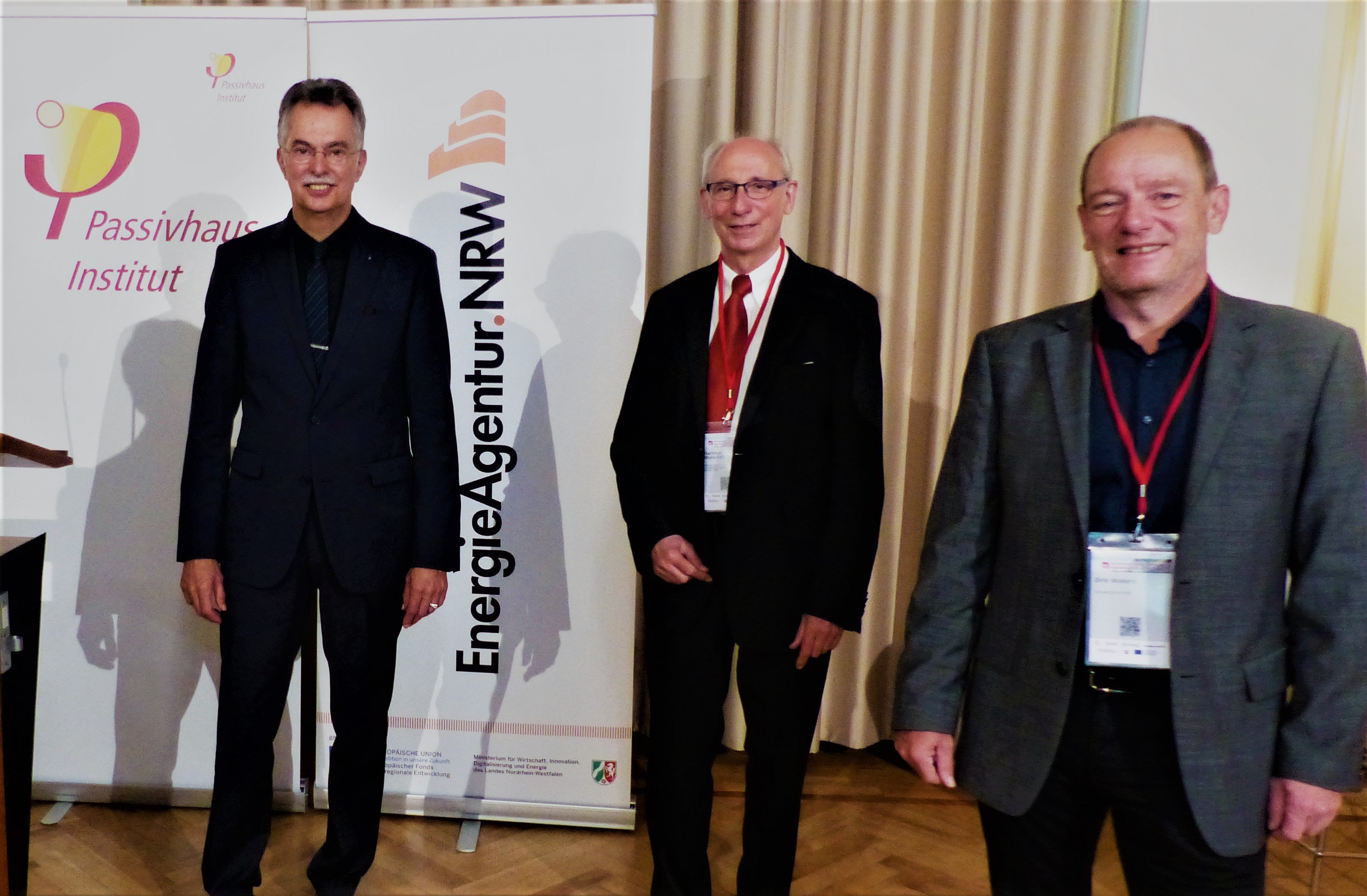
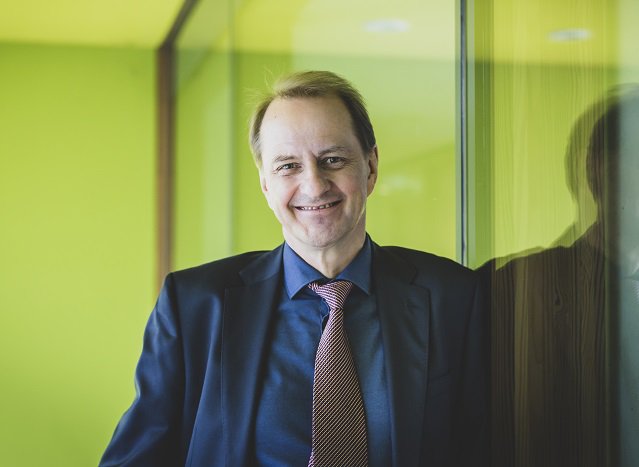
Districts - a rising trend
In his speech, the Director of the Federal Environmental Agency, Professor Dirk Messner referred to the social aspects: energy efficient construction and renovation offers a high level of living comfort which occupants rate very highly. "Let us build houses and districts which are good for the people," said Messner. Dr Hartmut Murschall of the Ministry of Economics in North Rhine-Westphalia pre-sented such a social concept: more than 50 climate protection housing estates in which aspects relating to energy efficiency, architecture and urban planning play an equal role have already been completed, with another 50 planned.
Venturing into new territory
Lord Mayor Uwe Schneidewind explained that the city of Wuppertal wished to become climate-neutral by the year 2035. The Passive House standard represents a crucial element for achieving these ambitious goals. Environmental scientist Ernst Ulrich von Weizsäcker posed the provocative question of whether the construction industry already knew that the climate had now become a very important topic of discussion. As Ernst Uhing, President of the Chamber of Architects of North-Rhine Westphalia, put it: "Sustainable construction is a part of building culture". Building and renovating in an energy efficient way was a great opportunity for building owners to reduce running costs permanently. He called on architects to venture into new territory and implement innovative design approaches "step by step and brick by brick".
Jubilee celebration
Most of the 14 winners of the Passive House Award 2021 participated via video stream to receive their awards from the Passive House Institute in Wuppertal in a virtual awards ceremony. A total of 87 international Passive House projects were submitted for this architecture competition. This was followed by the triple jubilee celebrations for the 30th anniversary of the first Passive House building, the founding of the Passive House Institute 25 years ago, and the 25th edition of the International Passive House Conference, including interviews on the background history and the matching cake.
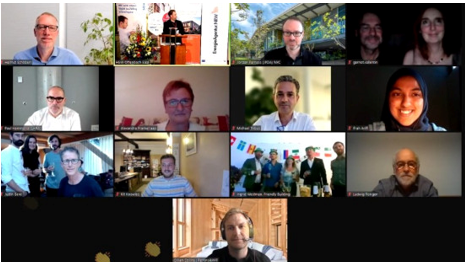
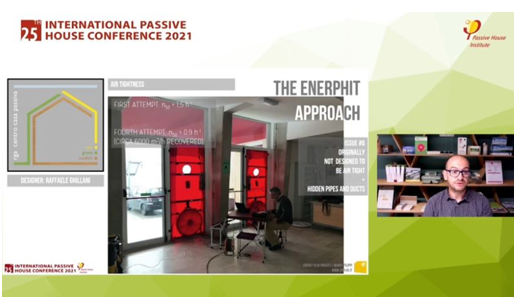
100 speakers
During the 4 days of conference, more than 100 speakers demonstrated the diverse ways in which energy efficient constructions and refurbishments have been implemented all around the globe. In a total of 16 lecture sessions, they presented new projects and districts built to the Passive House standard and retrofits to the EnerPHit standard, from around the world: including Spain, Italy, Canada, Poland, the United Kingdom, Austria and China. Ecological building materials, social housing construction, summer comfort and ventilation concepts were also discussed in detail in separate lecture sessions.
Anchored in policies
Education and further training, as well as strategies for even greater anchoring of energy efficient construction and retrofitting in policies and administration, were also focal points of the 25th International Passive House Conference. Suitable components for climate-friendly construction were presented by manufacturers during the ONLINE Passive House Exhibition, including windows and ventilation systems. A virtual excursion showcased impressive Passive House projects in Wuppertal and the surrounding region.
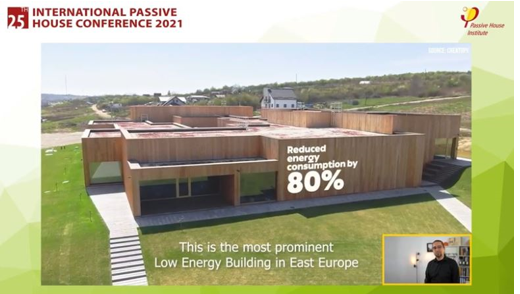
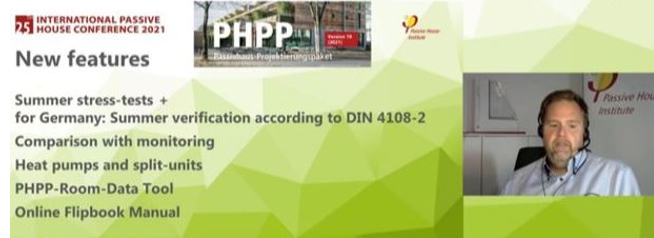
PHPP 10 released
A particularly pleasing piece of news for designers of Passive House projects was announced at the conclusion of the conference: the tenth update of the energy balance tool PHPP has been released. Among other things, PHPP 10 takes into account heat pumps as well split units and includes a stress test for summer comfort. In addition, PHPP 10 makes it possible to compare the energy balance with measured consumption data. The English language version of PHPP 10 is planned for Spring 2022.
For the next conference to take place earlier in the year again, the 26th International Passive House Conference will be held in Spring 2023.
